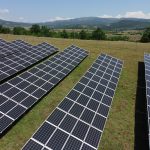Science and equity principles say it loud and clear that the EU’s plans to reduce emissions are not in line with the Paris Agreement objective and the transformation of our energy systems does not go fast enough. The question is if member states will set things right and shoot beyond the minimum ambition with their National Climate and Energy Plans.
Brigitta Bozsó and Klaus Röhrig are Climate Action Network Europe’s climate and NECPs experts.
This op.ed. was first published in Euractiv.
Europe feels pretty strained lately, torn between the cost of living crisis, the fossil fuel prices crisis and increasing climate impacts. And we have seen European capitals at work trying to answer to immediate crises, while sometimes forgetting that the quick responses should pave the way for the longer transformation that Europe needs instead of inefficiently patching an outdated system.
The ink is now drying on the most important climate EU legislation approved in the final days of 2022, while the energy files are going through the last round of negotiations these days. The bitter truth about the EU’s climate objective of reducing its net emissions by 55% by 2030 is that it is not in line with the Paris Agreement’s objective of keeping the global temperature rise to 1.5° and Europe’s fair share towards this target.
The freshly agreed climate targets will allow the EU only to marginally overshoot its insufficient commitment for 2030 emission reductions, leading to a decrease of net 57% emissions by 2030. This is still a far cry from what can be considered a minimum fair share contribution of the EU of at least -65% emission cuts by 2030 and achieve climate neutrality by 2040 at the very latest, taking into account the EU’s role as a major historic emitter and its capacity to act. Moreover, looking at how negotiations are advancing on the energy files, we do not expect the agreed targets to be ambitious enough either.
This is why this year’s revision of National Energy and Climate Plans (NECPs) is a key opportunity to set things right and overshoot the insufficient target and accelerate climate action in a fair and inclusive way.
While the EU law sets the minimum required ambition level of NECPs, there is no limitation on member states to design plans that go beyond the EU’s current level of climate and energy ambition and ensure that their actions on the ground are in line with the Paris Agreement objective of keeping global temperature rise to 1.5°.
A faster transition will not only free Europe quicker from the plights of our fossil-based economy, but also unlock the manifold benefits to our health, purse and energy security.
The Governance Regulation sets clear guidelines and requirements about these plans. Countries had to prepare and submit to the EU their first National Energy and Climate Plans in 2019. These are comprehensive ten-year plans that should describe how countries intend to address climate change, energy efficiency, renewables, greenhouse gas emissions reductions, finance, research and innovation and so on. These plans are concrete action pathways towards the needed major transformations. The problem with the first NECPs is that they are desperately unfit for purpose and outdated since their publication in 2019.
Now, in light of the updated EU climate goals and the war in Ukraine, these plans need to be revised and aligned with the ambition of keeping us safe from dangerous climate change and permanently reducing our energy bills.
There is no mystery whatsoever on how to get there. All the cards are in our hands and now it’s time to play our winning hand to secure the jackpot: ensure we all benefit from this transition, go for real emissions cuts, end the addiction to fossil fuels, supercharge the renewable revolution, stop wasting energy, protect nature, and push the fast-forward button.
With these national plans, Europe must go into a fast-forward implementation mode as we only have seven years to fundamentally change the way we produce and consume energy, the way we travel, the quality of the buildings we live and work in, the goods we consume, the way we protect and restore nature, and even the quality of the air we breathe.
Change is already on its way with the massive success of renewables deployment or the reduction of energy consumption to name just two. Instead of looking at it as a burden, rather embrace it and accelerate it as civil society and the crises we are living are demanding. A faster transition will not only free Europe quicker from the plights of our fossil-based economy, but also unlock the manifold benefits to our health, purse and energy security.
The alternative to change is a dangerous status quo that will end in a life catching up with us in the form of irreversible climate change. The climate crisis is a crisis we can and must respond to. Let us accelerate that response in this decade and move away from a grim reality and have the national energy and climate plans as an opportunity to bring the pieces of change together and build the sustainable present and future we need.



